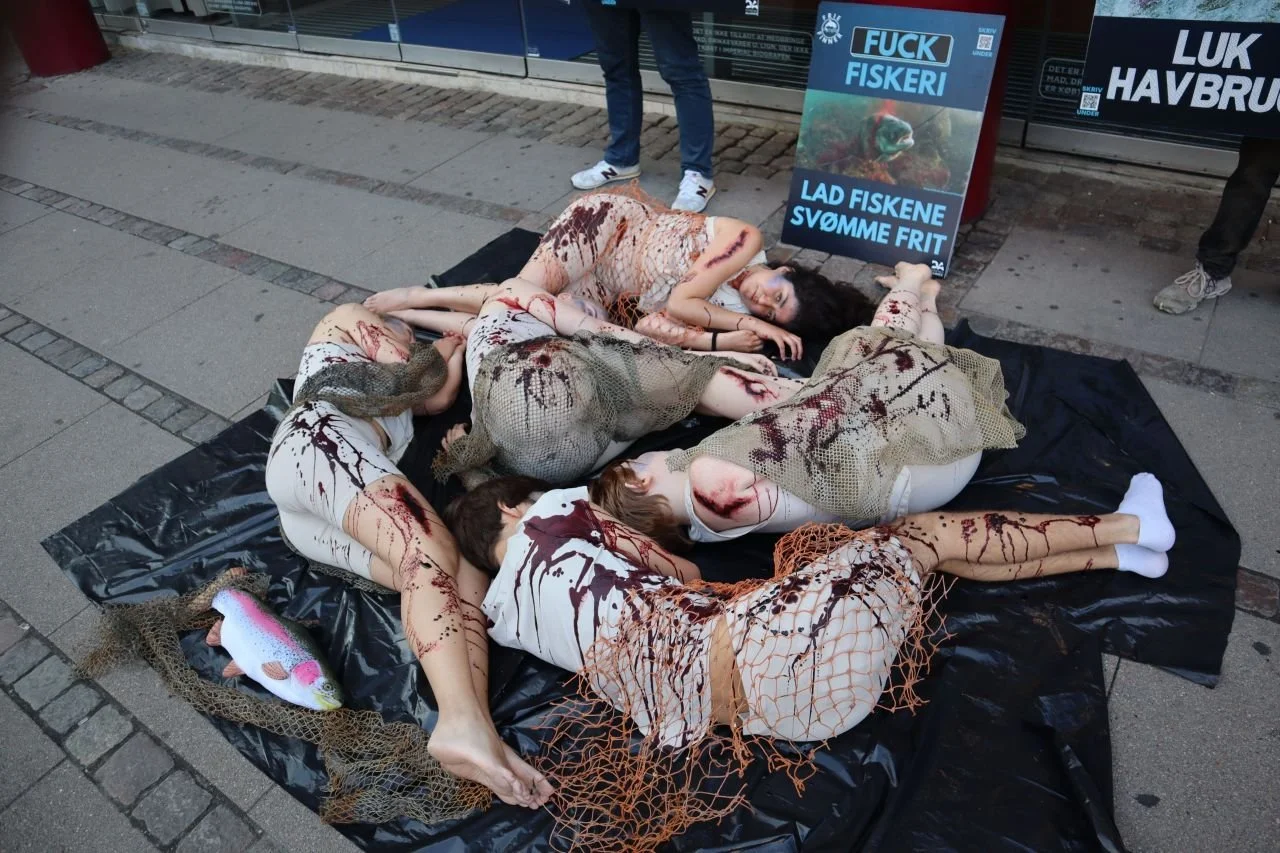Life in the ocean is far from a Disney movie: It's time to give fish free fins
Unge siger fra overfor dyremishandling
Ved gallapremieren til Den Lille Havfrue i maj måned samledes vi en gruppe unge aktivister, der nægter at tie stille. Med vores kroppe smurt ind i symbolsk blod og vores ansigter sminket som fisk indtog vi en cirkel foran Imperial i København – med målet at demonstrere mod den brutale dyremishandling, forurening og klimabelastning, der hvert år foregår i kæmpemæssige netbure i danske farvande. Vi i Dyrenes Alliance kræver retfærdighed for fisk og lukning af de danske havbrug.
Når danskerne rundt omkring i landet i disse dage går i biografen for at opleve Disneys nye udgave af Den Lille Havfrue, vil de blive tryllebundet af havets skønhed og magi. En forunderlig verden under overfladen med legesyge krabber, fornøjede fisk og smukke havfruer. Men dette er langt fra virkeligheden for livet for fisk i de danske havbrug.
Alle dyr skal behandles ordenligt
Ifølge Dyrevelfærdslovens paragraf 3 skal enhver, der holder dyr, sørge for, at de behandles omsorgsfuldt - herunder at de “huses, fodres, vandes og passes under hensyntagen til deres fysiologiske, adfærdsmæssige og sundhedsmæssige behov”. Dette er i stik modsætning til de forhold, som fisk lever under i de danske havbrug.
Havbrug kan beskrives som havets pendant til landbrug, hvor fiskene opdrættes i store bure af net placeret i havet. Her bliver millioner af individer mishandlet og frataget deres grundlæggende rettigheder. I de danske havbrug bliver fisk mast sammen, plaget af stress og sygdom, uden nogensinde at kunne svømme frit. Deres naturlige adfærd bliver undertrykt i fangenskab, og deres levestandard er langt fra den idylliske tilværelse, som vi ser portrætteret i Disney-film.
Vidste du at…
… forskelsbehandling på baggrund af art kaldes “speciesisme”? Bliv klogere på speciesisme her.
Fordi fisk ser anderledes ud end os - at de har skæl i stedet for hud, og gæller i stedet for lunger - bliver fisk ofte misforstået og er særligt udsat for dyremishandling. På trods af at der er videnskabelig konsensus om, at fisk – ligesom katte, grise og os mennesker - er i stand til at føle glæde, smerte og sorg. Ofte lever fisk i komplekse sociale grupper, udvikler dybe personlige relationer og oplever smerte og frygt, når de bliver skadet. De viser kærlighed ved at gnide sig mod hinanden og kommunikerer med lavfrekvente lyd. Disse skabninger har lige så meget ret til frihed og grundlæggende rettigheder som ethvert andet levende væsen på denne planet.
Det går ikke kun ud over fiskene - men også vores planet
Ikke nok med at vi udsætter millioner af fisk for lidelse og fratager dem deres frihed, har havbrugene tragiske konsekvenser for miljøet. De 19 danske havbrug udsætter vores hav for en giftig cocktail af kemikalier. Tonsvis af kobbersulfat, antibiotika og formalin ryger direkte ud i vores hav uden nogen som helst mulighed for at rense vandet - med katastrofale konsekvenser for havmiljøet i form af blandt andet iltsvind, bundvendinger og fiskedød. Politikere holder hånden over industrien, der gang på gang overtræder lovgivningen og behandler havet som en skraldespand.
En lukning af havbrug vil være i overensstemmelse med FN’s Verdensmål, hvis 4. mål er at bevare og sikre bæredygtig brug af verdens have og deres ressourcer - herunder at vi inden 2025 skal forhindre og væsentlig reducere forurening, bl.a. havaffald og forurening med næringsstoffer. Havet er Jordens lunger og spiller en vigtig rolle i at lagre carbon på havbunden og absorberer omkring 30 procent af den CO2, der produceres af mennesker. Når havbrug forstyrrer de marine økosystemer, kan de bringe uorden i disse processer. En beskyttelse af havet er derfor nødvendig for at afbøde klimaforandringernes konsekvenser. Hvis det nogensinde skal lykkes os at gå en retfærdig og bæredygtig fremtid i møde, må og skal det være uden havbrug.
Livet i havet er langt fra en Disney-film. I stedet for krabben Sebastian og fisken Tumle er vores danske farvande fyldt med lidelse. Lad Den Lille Havfrue-filmens magi inspirere og være en påmindelse om vores ansvar for at beskytte havet og dets beboere. Det er på tide at give fiskene frie finner. Lad os sammen skabe ringe i vandet og sprede ordet, så vi kan lukke danske havbrug.


